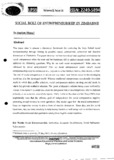Please use this identifier to cite or link to this item:
https://cris.library.msu.ac.zw//handle/11408/1557| Title: | Social role of entrepreneurship in Zimbabwe. | Authors: | Nhuta, Stephen | Keywords: | Social Entrepreneurship, Innovation, Economic Development, Social Imbalance, Value creation | Issue Date: | 2012 | Publisher: | International Journals of Multidisciplinary Research Academy | Series/Report no.: | International Journal of Physical and Social Sciences;Vol.2, No. 11; p.16-34 | Abstract: | This paper aims to present a theoretical framework for evaluating the logic behind social entrepreneurship through linking its possible causal, motivational, behavioral and directive dimensions in Zimbabwe. The paper develops various theoretical and empirical motivations for social entrepreneurs when the state and the businesses fail to address human needs. The paper addresses the following questions; Why do we need social entrepreneurs?. What areas are addressed by social entrepreneurs? How do social entrepreneurs create value?. Social entrepreneurship may be considered as a response to either business failure, state failure, or both. The role of social entrepreneurs is salient not only when such failures occur in the developing world but also the developed world. Whereas traditional entrepreneurs occasionally formulate needs to which they proffer solutions, social entrepreneurs address existing societal needs to which they provide workable solutions. The point of dispute is whether being a non profit entity violates Schumpeter's assumptions about the designated role of an entrepreneur, who is depicted primarily as an economic actor (Schumpeter, 1947). I refer to Boschee and McClurg (2003) they emphatically state that the ultimate goal of independence for social entrepreneurs requires generating enough revenue to cover operations. One would argue that the social entrepreneurs' focus on improving society is also a form of creative destruction. Since they aim for social betterment, they use their creativity to help destroy barriers to well being such as disillusionment, disenfranchisement and disorganization among those in grim social situations. | URI: | http://www.ijmra.us/ijpssvolume_november2012.php http://hdl.handle.net/11408/1557 |
ISSN: | 2249-5894 |
| Appears in Collections: | Research Papers |
Files in This Item:
| File | Description | Size | Format | |
|---|---|---|---|---|
| nhuta2.PDF | Full Text | 585.56 kB | Adobe PDF |  View/Open |
Page view(s)
150
checked on Jan 14, 2025
Download(s)
48
checked on Jan 14, 2025
Google ScholarTM
Check
Items in MSUIR are protected by copyright, with all rights reserved, unless otherwise indicated.


